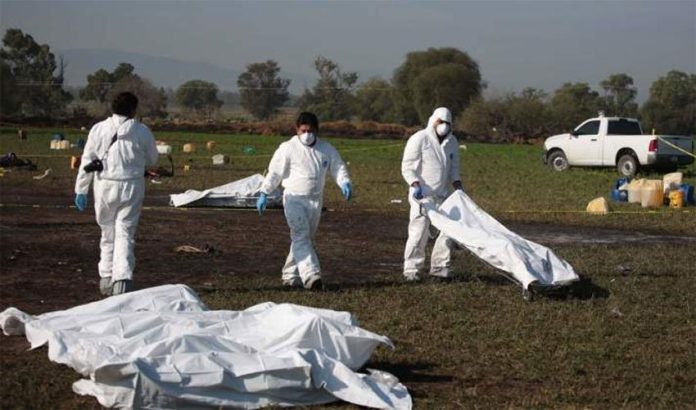Recovering DNA from the charred remains of people killed in the petroleum pipeline explosion in Hidalgo last month is almost impossible, genetics experts say.
The death toll from the blast and fire that spread across a field in the municipality of Tlahuelilpan on January 18 has reached 126. Of the 68 people who died at the scene, just 16 have been identified.
The remaining 52 bodies are undergoing DNA testing at the Pachuca morgue to look for matches with victims’ family members who have provided genetic samples, but as fire damages DNA molecules more than anything else, the task is extremely difficult.
“When organic remains are massively burned and charred, the DNA degrades,” explained Jean Phillipe Vielle, a researcher at the National Laboratory of Genomics for Biodiversity in Irapuato, Guanajuato.
“Even though it’s a molecule that is present in many parts of the body and [is located] on its surface, it has a tendency to degrade at high temperatures and that prevents us from being able to decipher the DNA code with current technology,” he told the newspaper Milenio.
At a temperature of 95 C, Vielle said, DNA begins to undergo a process of denaturation – “it loses the double helix make-up that allows it to be sequenced.”
In Tlahuelilpan, temperatures exceeding 1000 C – more than 10 times higher – were detected in the fire that followed the pipeline explosion, caused by an illegal tap to steal fuel.
However, Vielle said that hopes that the bodies can be identified are not completely lost because DNA in victims’ teeth could still be intact, despite the intense heat to which it was exposed.
“Fortunately, teeth are hermetic and in their roots you can often recover DNA that is preserved to such a degree that it can be extracted,” he said.
Mauro López, head of genetic laboratories at the Institute of Forensic Sciences of the Mexico City Superior Court of Justice, agrees that the task national and international experts are confronted with is extremely complex, meaning that victims’ families face a long wait for their loved ones to be identified – if it is possible at all.
“From my experience and certainly that of other researchers . . . it’s clear that a genetic profile cannot be obtained from burned, charred material. It’s going to depend on the [fire] conditions to which it was subjected,” he said.
López said that if remains received by laboratories tasked with conducting the DNA testing are in a state of virtual calcination or carbonization “genetic materials won’t be obtained,” adding that direct fire is one of the things that damages DNA the most.
Asked whether scientists faced a worst-case scenario with respect to the possibility of identifying the charred bodies, López responded, “unfortunately, that’s correct.”
Neither the National Laboratory of Genomics for Biodiversity, one of the leading centers in Latin America in its field, nor the Mexico City Institute of Forensic Sciences is involved in the identification process.
However, the director of the former, Alfredo Herrera, said the Irapuato facility stands ready to lend its expertise, although he explained that it has not been accredited to issue forensic reports.
“. . . Working with DNA is our daily bread here, we have specialists in human genetics as well as old [human] remains. Their degree of knowledge in working with such samples is significant. Indeed, we have a specialized laboratory that avoids contamination when working with human samples,” he said.
Last month, Hidalgo Governor Omar Fayad said that identifying the remains could take months and “the most difficult cases” could be sent to laboratories in the United States or Innsbruck, Austria, for analysis.
Researchers at the Innsbruck Medical University previously carried out DNA testing on bone fragments recovered from a river near the Cocula garbage dump in Guerrero, where the bodies of 43 students are believed to have been burned in 2014.
Source: Milenio (sp)
